Hard work. Honesty. Loyalty. Respect. Self-actualization
With the help of these values, my grandmother– whom I refer to as Ati– made a life for herself in the United States from a tiny beach in Puerto Rico.
Recaptured memories: The beginning
On August 12, 1935, Clara Oquendo Gordon–my grandmother–was born in Playa Humacao, Puerto Rico. She is the youngest of seven children, who, with their parents, all lived together in a small house on the Caribbean.
At the time, The Great Depression swept through the United States, spanning across the Atlantic Ocean and Caribbean Sea to Puerto Rico, too.
Humacao, much like the rest of Puerto Rico and the United States at this time, was a relatively poor village.
Everything that her family had, they earned for themselves; her family used their natural gifts and abilities to survive. “We never were hungry. My father had fishing nets; we would get fresh fish every day. My mother was a seamstress, so we always had nice clothes,” said Gordon.
Everyone pitched in to make ends meet — each family member utilized their own specialized role. Her father, who worked as a carpenter, built an outhouse for the family, as no one in their village had indoor plumbing. In fact, it was my grandmother’s job as the youngest child to cut up newspaper and magazine clippings for the outhouse.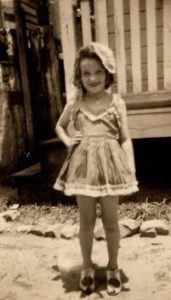
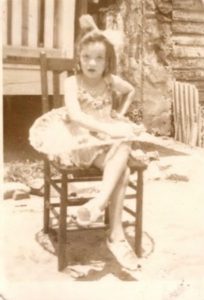
“We grew our chickens, so we always had fresh eggs and chicken. There was a community garden where we grew vegetables,” said Gordon.
Compared to the rest of the village of Humacao, Gordon’s family had everything that they needed. “Although we were poor, we never considered ourselves poor,” said Gordon.
Although the entire family constantly worked diligently to make ends meet, they always managed to make the best out of their situation.
My grandmother loved to model the clothes that her sister made, beautiful dresses constructed from whatever scrap material was available: cotton or muslin, crepe paper or tulle.
While living on the coast of the Caribbean Sea provided perks such as stunning landscapes, Gordon’s family felt the detrimental devastation brought on by hurricanes, too. Gordon recalls hearing her parents retelling the events of a particularly disastrous hurricane.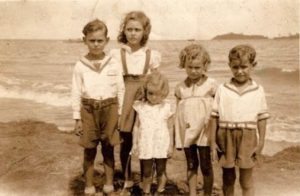
“Before I was born, there were big hurricanes in Puerto Rico that destroyed everything. Once, the kitchen of our house was found a few miles away; the sea and the wind took it away,” said Gordon.
Whenever a hurricane approached the village, all of her family packed up and moved inland to the city of Humacao to evacuate. Although the children ran the risk of returning to a destroyed home back at the beach, they didn’t view evacuation as a chore, but as a celebration or party.
Some of the fondest memories fostered in Gordon’s time in Puerto Rico were a result of difficult times in her family’s lives. However, through determination and family loyalty, they carried on.
Family sacrifices and college: The real world
All of the Oquendo family made sacrifices for the sake of the family. Right out of high school, Gordon’s oldest brother entered the army. “My brother made a career out of the army. He was the one who took us from Playa Humacao — poverty– to Rio Piedras,” said Gordon.
Every week he would come home toting a large, green bag teeming with food and treats for the family. He even bought the family their very first refrigerator, something the entire neighborhood had never had before.
Although her family lived in Rio Piedras at the time, Gordon had not yet graduated from her old middle school in Humacao. Her oldest sister Carmin put her life on hold, her husband and her family, and stayed behind to take care of Gordon until she graduated. “That is something that I always appreciated from her; and I always appreciated that my brother moved us from the poor area where we lived into the metropolitan area of San Juan,” said Gordon.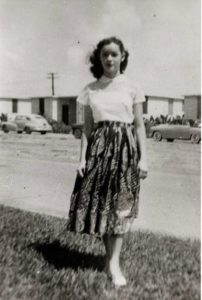
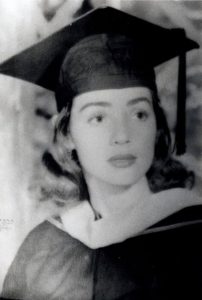
Just like the rest of her sisters, Gordon went to college on a scholarship. “We just wanted to get better. We had that need for education,” said Gordon.
She attended the University of Puerto Rico in San Juan. After taking the general basic education classes at the university, she still did not know what she wanted to study or what career she would pursue.
“One of my sisters, who at that point was carrying the economic burden in our family, wanted to get married. She said, ‘Why don’t you study…to become a secretary? Then, you can take over for me.’ And so I studied to be a secretary,” said Gordon
Her first job was working with a retired military man. “I did not like it,” said Gordon.
However, Gordon continued to work as a secretary for two years in order to provide for her family, just as they sacrificed in order to provide for her.
A difference in culture: The transition
When the company that my grandfather worked for closed the Puerto Rico department, my grandparents were given the chance to relocate to the United States.
When faced with the decision of leaving her home behind, Gordon didn’t feel prepared to move to the United States. “I was not ready at that time to leave my family,” said Gordon. So Gordon’s husband accepted multiple other jobs in Puerto Rico, until he finally accepted a long term job with the FDIC.
Through this government job, my grandfather later received a job offer for another position in the United States. After thinking it over, my grandparents came to a new conclusion: they would move to the United States. “I made a bad decision once; I’m not making a bad decision twice. It’s my husband’s career, so we will transfer and move…but it was a shocking experience,” said Gordon.
Upon first flying into the United States, my grandparents and their daughter–my mom– recalled the shocking geographical differences between the island of Puerto Rico and the rolling plains of Knoxville, Tennessee.
However, the differences between Puerto Rico and Tennessee stretched far beyond geography. As the Gordon family spent more and more time in the United States, they noticed all of the cultural and social differences between the Caribbean island and the continental US.
Culturally, one of the biggest differences between the two? Football.
Besides the vast influence of sports on daily life in the continental United States, one of the biggest contrasts was the sheer size of the schools in Tennessee. My mother, just 13 at the time, was searching for schools in the area that she would soon attend when she realized just how different her new experience in the states would be.
Facing discrimination: Struggles in the United States
For many Hispanics transitioning to the United States, the most trying part of the journey is actually reaching the United States. However, for my grandmother, many of her struggles occurred after she arrived.
Gordon had all of the necessary qualifications for her various jobs: a college degree, a bachelor’s degree in business administration, a degree in accounting, and a master’s degree in business. She worked for the General Accounting Office back in Puerto Rico and eventually in Knoxville. In the United States, she worked with the Department of Energy surrounding nuclear facilities.
Clearly, she was more than qualified for her job, but many failed to overlook the fact that she seemed “different” than others.
“Everybody noticed my accent. That was considered not good because I had an accent, and I was not ‘American’, I was not from the US. I felt discriminated against. I was passed over for people for the benefit of local men that were less qualified [even though] I had a master’s degree,” said Gordon.
This idea of “othering”, or the idea that certain people are alien to oneself, stretched far beyond Gordon’s professional life.
“Every time I opened my mouth, people would ask, ‘Where are you from?’, to the point where I was beginning to resent it. They made me feel like I was so different, they made me feel like I did not belong,” said Gordon.
Nevertheless, Gordon fought to overcome the discrimination that overshadowed many aspects of her life in the United States. She was determined to ensure that her children and grandchildren felt as supported as she did during her childhood.
For that reason, when Gordon heard that she would soon be a grandmother, she moved to Raleigh to care for her granddaughter, just as her family had cared for her. She endlessly worked to instill the same values that her family instilled in her: hard work, honesty, loyalty, respect, and self-actualization.
Gordon ends with one final thought: “My number one lesson is… to be true to yourself. I will never, ever, forget where I came from, and how I was able to come from humble origins to a successful life.”

Leave a Reply